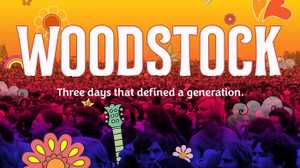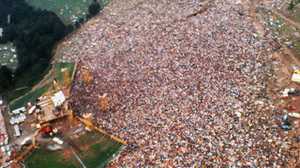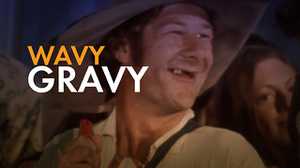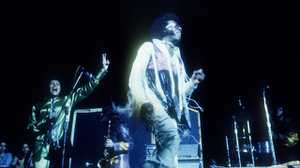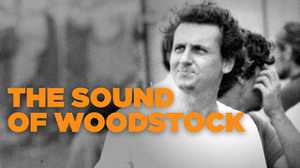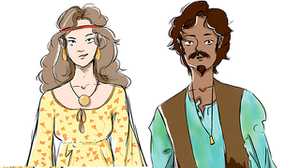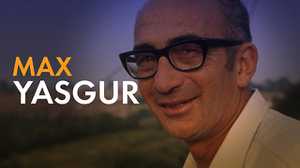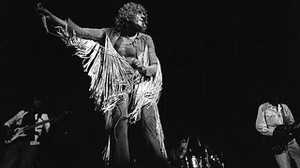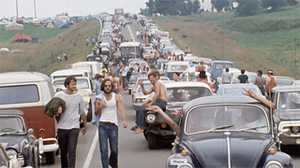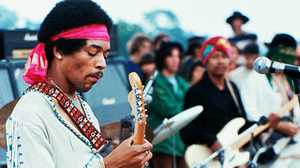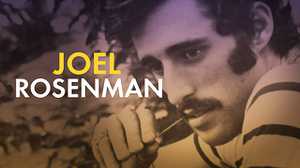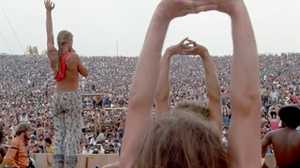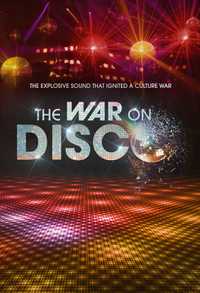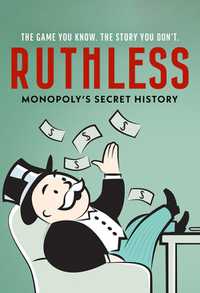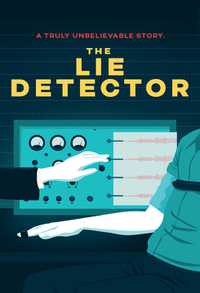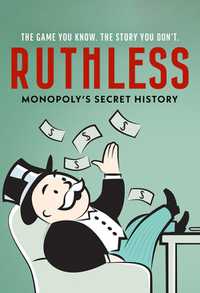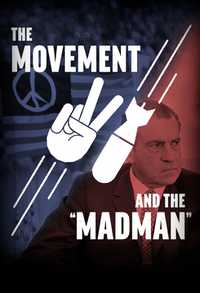Stage Announcement: It looks like we’re going to get a little bit of rain so you better cover up.
BETHEL, NEW YORK
AUGUST 17, 1969
Stage Announcement: Everybody who’s in the back, please move back! Please move back. We have to get away from these towers. Put the mic stands down. Cover all the equipment.
Joel Rosenman: We were all in our mid-twenties. We had created something that was much bigger than we had anticipated.
Stage Announcement: I see it. All of you up in the towers please come down. You are making it very, very dangerous. All right everybody just sit down, wrap yourself up, we’re going to have to ride it out.
John Morris: Everything that could possibly go wrong was happening. I mean, it was all hell breaking loose.
Stage Announcement: Hold on to your neighbor, man, and let’s think hard to get rid of it, please.
Crowd: No rain! No rain! No rain! No rain! No rain! No Rain! No Rain! No Rain! (continuous)
Susan Reynolds: When you think about it, it could have been an absolute disaster.
Baron Wolman: And I just kept thinking, which direction is this thing going to go?
Stage Announcement:Alright, keep yourself comfortable. It’s gonna blow through.
Song:Thunderclap Newman – Something in the Air
Susan Reynolds: We did not plan ahead, we did not plan where we were going to stay, we didn’t think about food. It was just like, hey, this sounds like fun. Let’s get in the car and go.
Peter Beren: We would pack as many hitchhikers as we could in the car, sitting on top of each other. And as we got closer, there would be people walking on foot like pilgrims. It looked like a pilgrimage.
Laureen Starobin: We were looking for answers. We were looking for other people that felt the same way as we did.
Jon Jaboolian: No matter where you looked you saw people. It was like a field with people growing in it. I had never, never seen that many people in my life in one place at one time.
Paul George: My feeling was, this is what we’ve been talking about, this is what we’ve been aiming for, this kind of freedom.
Laureen Starobin: If 400,000 people could get together and have absolutely no violence, absolutely no conflict, I felt like if we could bring all that love back into society, we could change the world.
Three years earlier
Song: Bobby Hackett – I’ll Take Manhattan
John Roberts, Producer (voice of): I grew up in New York City, and I came from a wealthy family. My mother died when I was young so when I was 21, I inherited about a quarter of a million dollars. That was quite a bit of money in those days. I had a job down on Wall Streetdoing research.
Joel Rosenman, Producer (voice of): When I met John,had just gotten out of law school, and was playing with a band, down in the Village and at the clubs on 2ndand 3rdAvenue, but I was starting to get a little frayed at the edges. Neither one of us, I think, was really on a career path that we knew was the right one.
John Roberts:Joel and I met playing golf. We hit it off, and uh, we thought we’d go into business together, investing this money that I had.
Polident TV ad (archival): The denture cleanser you’ve hoped for is here at last. Start using new effervescent Polident tablets today.
Cue: Booker T and the MGs — Green Onions
Joel Makower, Writer (voice of): John’s grandfather founded the Block Drug Company, the maker of Poligrip and Polident. That fortune was the source of the seed money for a recording studio in midtown Manhattan, Media Sound, which for John and Joel actually turned into their first successful venture.It was because of Media Sound, that John and Joel met Michael Lang and Artie Kornfeld.
Reporter (archival):How much do those matches sell for?
Michael Lang (archival):Sixty-five cents for the roll.
Joel Makower: Michael had had a head shop in Miami, in Coconut Grove, the center of activity for the hippie culture down there.
Reporter (archival):Is that a pipe?
Michael Lang (archival):Yeah, it’s a Turkish water pipe, with two hoses.
Cue: Original score
Joel Makower: In 1968, he moved to Woodstock, New York, about 100 miles north of New York City, and was introduced to Artie Kornfeld who was a vice president at Capitol Records.
John Roberts: They called us in early 1969 and said “We’re very interested in building a recording studio in Woodstock, New York. We know that you and Joel were involved in building one in New York City. Would you meet with us?” We said, “Sure!”
Joel Rosenman: When we met them, they were quite different from us, meaning a lot of fringe, a lot of buckskin, and a great deal of hair. John and I were making an effort to look like businessmen at the time, so we couldn’t have represented more distant ends of the spectrum.
John Roberts: What Artie said, was basically, Woodstock was a center for artists, and that a recording studio there would have a natural constituency, and it would be a success.
Joel Rosenman: As we were looking through the proposal that they’d given us, we noticed an idea for an opening day party, where musicians who lived in the area – Tim Hardin, John Sebastian, Bob Dylan – would perform. I said, “The idea of having a concert with those stars, I mean, why don't we skip the studio idea and just do a big concert? We could make a fortune."So, in late January 1969, the four of us shook hands, and started brainstorming what Woodstock could be.
SOT (archival): To the hippie youth of today, this is part of their real world. This is the atmosphere at the Monterey Pop Festival. The music is frantic, the sounds are wild, and the mind is free.
Canned Heat (archival): “Rollin and Tumblin, I cried the whole night long…”
Bob Spitz, Writer (voice of): Outdoor rock festivals were a pretty new concept at the time. They had begun in 1967 with Monterey Pop. And by 1968 – ‘69, there had been a few festivals scattered around the country.Michael Lang was the only one of the four that had any experience in the concert business. In 1968, he had helped produce a festival in Miami that was a huge disaster. It was held at a racetrack, had very little atmosphere, it rained, there were a lot of lawsuits afterwards; the festival never really came off.But Michael knew that this is what he wanted to do. And he had this idea of taking the festival out of the racetrack and putting it in a bucolic place.
Michael Lang, Producer (voice of):I had been thinking about doing a series of concerts in Woodstock. And I always thought that if you could dream it up, you could put it together. And this was a chance to make, you know, a dream come true.
Cue: Original score
Joel Rosenman: Michael and Artie had optioned a property in Woodstock, but it was far too small, it was just ten acres. So that didn't work out. A property in Saugerties didn’t work out. And then John and I found a piece of property that was in Wallkill that was being turned into an industrial park. It didn’t knock you out visually, but it was available.
Joel Makower: Michael hated it. It was everything he didn’t want, just a flat, barren piece of land that had no trees, no soul.
Michael Lang: You know how some pastoral scenes are beautiful and calming and make you feel comfortable and at peace? This was completely the opposite.But we needed to get going, we needed a site, and I felt that we could transform it into something more spiritual and special.
Cue: Jefferson Airplane – Embryonic Journey
Bob Spitz: The town signed off on the festival as a, kind of a music and arts fair, where kids would walk around and look at art and hear some music in the background and An Aquarian Exposition, which is what they called Woodstock, had some kind of mystical feel to it.
Joel Rosenman: Michael suggested that, like Monterey, we should have a crafts village, and an art exhibition, alongside the music. We all loved it! It was such a natural add-on to what we were thinking about.We wanted to make it like visiting another world, like visiting the world you were dreaming about, if you were a young person. This shining place that you could go to, and feel that you weren’t a misfit, or that you weren’t on the wrong side of a debate, or that you weren’t under the suspicious eye of the authorities.
Joel Makower: For the generation that was coming of age in the late ‘60s, everything was up for grabs.Young people were rejecting the status quo, whether it was your parents, or whether it was your community or the business establishment. This counterculture, as it was called, influenced music, it influenced art, and it certainly influenced the way people dressed. But clearly, politics was at the center of the counterculture, because the one thing that affected everybody, was the war in Vietnam
News Anchor (archival): Last week’s casualty figures in the Vietnam war, released today, showed 299 Americans killed, 355…
Paul George, Festival Attendee (voice of): I remember watching the news in, you know, 1968 and asking my father why are we fighting in Vietnam and his answer was always “because they’re communists.” I didn’t find that satisfactory.My father had been in World War II in Europe, in the Signal Corps. He always made clear that he thought the army was a great experience and everybody should do it. He just had a very positive view of serving one’s country that way. And he did support the war in Vietnam.
Cue: Steppenwolf – The Pusher
Susan Reynolds Festival Attendee (voice of): The men of the World War II just assumed their sons would also be soldiers. That’s how you became a man, you grew up, you served your country. So my older brother, Jim, signed up for the Naval Reserves. I remember the day he went to Vietnam, and being terrified.
Michael Lindsey, Festival Attendee (voice of): When I was 18, I had to register for the draft. I was in college, so I got a deferment. But there was always that thing in the back of your mind. You knew that they were just one step behind you.If you were in college you better hope you had all your money straightened out and grades were good and everything else because if you dropped out, you were going to Vietnam.
Peter Beren, Festival Attendee (voice of): When I was 20 years old, I was faced with a draft physical. I’m putting down that I’m a bedwetter, that I’m a homosexual, that I’m a communist. I think there were 14 things in all that I had written down. So they escorted me over to the psychiatrist. He just said, ‘Kid, I’m gonna give you one year to straighten yourself out’ and he gave me a deferment for 12 months.
Rick Dills Festival Attendee (voice of): There’s no way to describe how terrifying it was to be a 17-year-old, knowing that the Vietnam war was your fate. I wasn’t alone in any way, in transitioning from being personally afraid of the war, to being politically opposed to it.
March on the Pentagon (archival):You kill people! You kill people! You kill people!
Peter Beren: I participated in a couple of marches on Washington, anti-war rallies. The war was insane. You know, an insane conflict that, uhm, made everybody crazy, whether you were fighting the war or fighting against it.
SOT: Hell no, we won’t go!
Archival: This is a CBS News Special report…
And then, on top of everything else, Martin Luther King was assassinated.
Dan Rather (archival):The Reverend Martin Luther King Jr. was shot to death by an assassin late today, as he stood on a balcony in Memphis, Tennessee.
Michael Lindsey: When Martin Luther King was killed, I knew a lot of people who just felt we have to do things differently, because the way the establishment havedone things has led to this.
Paul George: By the time I got to be 16, I was really questioning the way society is structured. I objected to racism, I objected to inequality, consumerism and poverty. I objected to the war in Vietnam.
Senator Robert Kennedy (archival):One thing is clear in this year of 1968 and that is that the American people want no more Vietnams.
Michael Lindsey: Of course, we had hope for Bobby Kennedy. He seemed to be one of us in a lot of ways. We really felt that he was finally going to be able to change things.
Susan Reynolds: You know he was out there espousing peace and fighting against poverty and racism and all the things that we believed in and wanted so deeply. He was our voice.
Peter Beren: In June of 1968, I was leaving a bar in my hometown. I turned on the radio.
Cue: Original score
SOT: The Senator is lying with his eyes closed, absolutely unmoving, blood underneath his head.
Peter Beren: I heard the assassination of Robert F. Kennedy as it unfolded in real time. And it just completely undid me.
Archival:Senator Robert Francis Kennedy died at 1:44 AM today, June 6th,1968.
Laureen Starobin, Festival Attendee (voice of): The shock of it was just, devastating, absolutely devastating. Martin Luther King and then Bobby Kennedy. You know, all these peacemakers.
Jon Jaboolian, Festival Attendee (voice of): I was like ‘Oh, this is what we do this is what we do.’ You know as soon as somebody tries to speak out, and they’re too forceful, this big machine, whatever the hell it is, is gonna shut them up. The only thing that we took solace in was music, and there was a lot of politically conscious music we were listening to. You know, like Buffalo Springfield.
Buffalo Springfield (archival):There something happening here. What it is ain’t exactly clear. There’s a man with a gun over there. Telling me, I got to beware. I think it’s time we stop children, what’s that sound, everybody look what’s going down.
Laureen Starobin: When I was so disillusioned with everybody else’s thinking, I could escape into my music. It was such a comfort to me. You know, I hadn’t met a lot of people at that time that felt like I did. But when I listened to music, those people were there.
Buffalo Springfield (archival): Young people speaking their minds, gettin’ so much resistance from behind…
Susan Reynolds: We couldn't wait for Saturdays when we could go buy the latest record and come home and literally lay on the floor and play it over and over and over. My father hated the music. He was always clapping his hands over his ears and just saying, ‘”Damn hippies!”
Bob Dylan (archival):Come gather 'round people wherever you roam and admit that the waters around you have grown, and accept it that soon you’ll be drenched to the bone…
Michael Lindsey: Dylan’s song The Times They Are A Changin’ basically said to our parents’ generation “get out of the new way if you can’t lend a hand.”
Bob Dylan (archival):… and you better start swimming or you’ll sink like a stone, for the times they are a-changin'.
Music had our ideas. For my generation, that was the thing. Especially our political views.
Creedence Clearwater Revival (archival): It ain’t me, it ain’t me, I ain’t no military son. It ain’t me, it ain’t me, I ain’t no fortunate one.
Donald Goldmacher, Volunteer Doctor (voice of): Music was terribly important to us. I came to the San Francisco Bay Area in June ’67, and there was music everywhere. There were free concerts going on in Golden Gate Park, with all of these bands. I got to see Janis Joplin, The Jefferson Airplane, and The Dead, free. It really was amazing.
Grateful Dead sound up (archival)
Peter Beren: Music and the lyrics became our tribal drum. So we had, uh a kind of secret communication going in the river of music that flowed through us. You know, mt was a wild liberation. It was Dionysian. And drugs played a big part in that.
Cue: Traffic – Dear Mr. Fantasy
“…Something to make us all happy.”
Paul George: We smoked a lot of pot and did a fair amount of acid. You know the society that we’re rebelling against, they don’t want us smoking pot. Must be a good reason to smoke pot.
Katherine Daye (voice of): The more that we as a generation saw that what had been rammed down our throats was false - it was false, it was a lie - the more it freed us up to experiment. I mean, we had free love. The pill allowed us to just go to a party and be with somebody. We just reveled in having that much freedom and that much ability to piss off your old man.
Governor Ronald Reagan (archival):Movies were shown on two screens at the opposite ends of the gymnasium. They consisted of color sequences that gave the appearance of different colored liquids spreading across the screen. Sexual misconduct was blatant. The smell of marijuana was prevalent all over the entire building.
Michael Lindsey: By 1969, it really did feel like we were finally winning, some kind of cultural war against the establishment. You know, this was how we lived, and if you didn’t like it, too bad. We were seeing that America wasn’t what we were taught it was, and when you stop looking at it that way and you start trying to figure it out for yourself, then um it changes your life forever.
May 1969: Three months before the festival
Cue: Willie Mitchell — Grazing in the Grass
Joel Makower, Writer (voice of): Once they got the permits that they needed from the town of Wallkill, the first thing that John and Joel and Michael and Artie did was to assemble a core team to help produce the festival. There was Stan Goldstein who had worked with Michael on Miami Pop. There was John Morris who had experience booking acts. Chip Monck whose role was stage design and lighting. Bill Hanley, one of the pioneers of event production sound. These were guys who knew how to put together an event. Stan called his friend Mel Lawrence to be the director of operations.
Mel Lawrence, Director of Operations (voice of): My mission was to, um, plan for all of the functions of the festival aside from the actual show. Everything from fences to food, to transportation, to fire access, lines of communication, security, water, sewage, you know this, that. I made a checklist that blew everybody's minds.
Stan Goldstein, Festival Organizer (voice of): One specific thing was toilets. We knew we’d have to have a lot of them, no one knew how many. So, I began going to events with a stopwatch and clipboard. Madison Square Garden, baseball stadiums, any place that there were a lot of people. And I timed them, going in and coming out, going in and coming out. I took all the information I gathered, multiplied it by the size of the crowd we thought we might have, and came up with outrageous numbers of johns. Tens of thousands, just impossible numbers. So we lined up as many as we could get.
John Morris: I was in charge of the booking, and Creedence was the first band that we booked. And then we got Jefferson Airplane, Joe Cocker and Ten Years After. We didn’t get the Stones, or Dylan, or The Doors, but we booked a lot of the acts we wanted to, including The Who and Jimi Hendrix.
Cue: Kusiak score
David Crosby, Musician (voice of): We had just started planning our first tour as Crosby, Stills, Nash, and Young, when we heard that Hendrix was going to play it, and The Who, and Sly, and Airplane, the Band, the Grateful Dead, you know everybody that we thought was cool.
Bob Spitz, Writer (voice of): They needed to get the word out about the festival. They had a channel to do that through the alternative press. There was the Berkeley Barb and The Rat and the Village Voice, and word about the festival poured out, not just to New York where they thought they would draw the most people from, but all across the United States. Woodstock was on everybody’s lips.
Katherine Daye, Festival Attendee (voice of): Tom and I subscribed to Rolling Stone Magazine, and long about oh, early May, I started seeing these ads for a three-day festival with all these bands that we loved. And I said ‘Tom! You wanna go to this?’
SOT - Radio Broadcast:For tickets and information write to Woodstock Music and Art Fair, Box 996...
Donald Goldmacher, Volunteer Doctor (voice of): We heard it on the radio. They were describing this happening to be and that people were coming from all corners of the United States and apparently from abroad as well.
Bruno Eliard, Festival Attendee (voice of) - subtitles: I was just 20 years old, and I was passionate about music. I read the British magazines New Musical Express and Melody Maker and they announced the Woodstock Festival. My number one goal was to attend Woodstock.
Frances Schoenberger, Festival Attendee (voice of)– subtitles:When I came to America in ’69, I was 23 years old. It was through a colleague of mine that I heard a huge outdoor concert was planned, and did I want to come along? I had no idea what to expect. I’d only been to New York, in Manhattan, for three weeks.
Buskers (archival):Hey, Mr. Tambourine man…
Susie Kaufman, Festival Attendee (voice of): I was hanging out at the fountain in Washington Square, with my guys who were all musicians, and then all of the sudden tickets were being made available. You could buy one day, two days or three. And jeez, three days! Wow! That means staying there overnight, wow what an adventure that would be. We gotta do this!
Cue: Kusiak score
Bob Spitz, Music Writer: It was early June, so they started to build out the Wallkill site. They brought in electricity and they started to lay the groundwork for a stage, and they hired a couple hundred kids to help out, and these kids, they didn’t look like anybody else in this town.
Joel Rosenman, Producer (voice of):They were a little suspicious about us, but we just forged ahead. All that did was I guess sound the rallying cry for what called itself The Concerned Citizens Committee of Wallkill.
John Roberts, Producer (voice of): They didn’t like the looks of the people who were working on the site. They didn’t like long hair, rock music and all that that implied to them. We really tried to practice good community relations, but the Concerned Citizens had the wind up.
Bob Spitz: Wallkill was a pretty conservative place. The way they saw it, these were kids who smoked dope, who had casual sex, they didn’t want these hippies in their town.
Joel Rosenman: John and I were having dinner in New York City when the town of Wallkill passed an ordinance saying you can’t have a gathering of more than 5000 people. Essentially it just legislated the possibility of a festival on this property out of existence. But we had already sold so many tickets and hired so many bands we couldn’t turn back at that point.
Cue: Canned Heat – Going up the Country
John Roberts: It was like being on a rollercoaster that had just crested the rise, you know, before that first enormous plunge. I contemplated the abyss of a total wipeout and thought, “Let’s not declare bankruptcy. Let’s throw this festival.”
Canned Heat:I’m going up the country, baby don’t you wanna go. I’m going up the country, baby don’t you wanna go. I’m going to some place I’ve never been before...
Joel Makower: It was the first week of July, about five weeks out, so there was a mad scramble to find a new site. They drove around upstate New York talking to local people, real estate brokers, anyone who would listen.
Mel Lawrence: Michael and I, we must have looked for a week or maybe ten days, renting helicopters and going here and going there. And then we’d meet Max Yasgur.
Bob Spitz: Max was a farmer. And he was very successful. His dairy supplied almost everybody in that area with milk. Everybody knew Max Yasgur.
John Conway, Local Resident (voice of):Yasgur, was uh, you know, he was a law and order Republican, but you know, he also believed in personal freedom and freedom of expression and that’s what he hung his hat on.
Michael Lang, Producer (voice of):We went to see Max, and we just hit it off. I think he liked the fact that we were doing something in the face of a lot of adversity and that we believed in.
Mel Lawrence: Max takes us to the top of this hill and there it is! A natural amphitheater. Michael and I looked at each other: This is it!
Bob Spitz:This was exactly what they were looking for and they made a deal with Max right there on the spot.
July 15, 1969
Four weeks before the festival
Cue: Kusiak score
John Roberts, Producer (voice of):Joel and I went up to get some kind of handle on the town politics. We sure didn’t want to get into the same problem there as we had in Wallkill.
Joel Rosenman, Producer (voice of): We were asked to fill out our attendance expectations in the permit application. We used Monterey Pop’s record, 28,000 people a day, or something like that, as the baseline. We multiplied it times two and said in our wildest dreams, this is what we’re hoping for. And within a couple of days, we got our permits.
Miriam Yasgur, Co-owner, Yasgur’s Farm (voice of):A sign was erected near our house that said something like, ‘Don’t buy Yasgur’s milk, he loves the hippies.’ And I thought to myself, you don’t know Max because we’re going to have a festival.
SOT: The Woodstock Music and Art Fair, the three-day Aquarian Exposition, will be held at White Lake, in the town of Bethel, Sullivan County, New York. And on Friday, August 15th you’ll hear and see Joan Baez, Arlo Guthrie, Tim Hardin, Richie Havens, Incredible String Band, Ravi Shankar, Sweetwater...
Cue: The Byrds – Wasn’t Born to Follow
John Roberts: Everyone felt excited about the possibilities of the new site but there was a lot to be done.
Joel Rosenman: We had to start all over again to construct what we had built in several months in Wallkill in less than four weeks.
John Roberts: The half a million at the old site was all down the drain, right? We have to put another $800,000 into this one. Building a stage, getting the lights and the sound system up, fences, food concessions, portable toilets, I mean it was extraordinary. And Joel and I had never done any of this before.
Joel Rosenman: But because of ticket sales, we actually felt that we were gonna turn a profit.
Bob Spitz, Writer (voice of):They knew by this time that there were going to be more than just 50,000 people. Ticket sales looked like it was going to be closer to 100,000. And with 100,000 stoned out kids, they knew there could be some difficulties.
ReporterInterviewing Paul Butterfield (archival):There's been some trouble at a few of the pop festivals. What do you think brings that about, why will it happen at one place and not another?
Paul Butterfield, Musician (archival):You know I really don’t know. Like, in Miami they broke down the fence, and they had a lot of fights.
ReporterInterviewing Paul Butterfield (archival):Do you think it has anything to do with the size of the audience?
Paul Butterfield (archival):I think it has a little bit to do with the size, but it has more to do with the way that the festival is organized.
Cue: Kusiak score
Wes Pomeroy, Head of Security (voice of):To see what was really happening we sent people to almost all the major rock festivals that summer. They went to Atlanta, they went to Denver and they went to Newport. At every one there were problems. They had teargas used in Denver, they had violence in Los Angeles county. So back in New York, they kept insisting that they needed to have security people for safety. I told John, all the cops in the world weren’t going to prevent violence. It had to depend upon building the kind of expectation and a feeling of this event we’re gonna have so that people didn’t want to hurt each other.
Stan Goldstein, Festival Organizer (voice of):
We also knew that there would be a lot of drugs around and there would be a lot of people who couldn’t handle whatever it was they were going to take and that that had to be dealt with as well.
Romney (archival):Hi there, uh, my name is Hugh Romney and I’m going through a series of changes in this fur room at the Electric Circus store. What is essentially on the front of my brain is this Hog Farm poster, which we’re gonna be moving all around the country, we being a commune.
Joel Rosenman: Stanley Goldstein suggested that we look to this (laughs) commune called the Hog Farm and that we should bring as many of these folks to the festival as we can and have them handle our security. So he went and met with a fellow named Hugh Romney, also known as Wavy Gravy.
Wavy Gravy, Founder, Hog Farm (voice of): We’d been driving around the country, putting on these shows. We had a certain skill with working with large crowds. We were a happening.
So Stan Goldstein shows up and says, ‘How would you guys like to do this music festival in New York State? And we said, ‘Well it sounds like a good time but we’re gonna be in New Mexico.’ And he says, ‘That’s alright, we’ll fly you in in an Astrojet.’
Cue: Rhinoceros - Apricot Brandy
Wavy Gravy: And indeed 85 of us boarded this American Airlines Astrojet going to Woodstock.
Tom Law, Member, Hog Farm: We all arrived at the Albuquerque airport and loaded up a couple of sets of teepee poles and flew off to uh, New York.
Wavy Gravy: The stewardesses locked themselves in a little room, and we just took over the plane. We got to New York City, piled off the aircraft, and there was the press.
Reporter (archival, hog farm arrival): What is the Hog Farm going to be doing at Woodstock?
Wavy Gravy (archival): Well the Hog Farm is the many sided, multi, kind of a family. We’re a huge extended family. And we could do any number of things because each one of us is gonna do a different thing. But mostly we’re just gonna try to be groovy and spread that grooviness through everybody.
Reporter (archival): Well the Hog Farm has been hassled by security people, and they’re calling you security people, so how do you feel about the name?
Wavy Gravy (archival): Well I feel secure, I don’t know what ‘security people’ means. I never was called a security person before. It’s like you’re the first person that’s ever called me that, how do you feel?
Reporter (archival): Well I feel..
Wavy Gravy (archival): Do you feel secure?
John Roberts: There was a picture in the Post the next day. My father called and said, “Nice cops you’ve hired.” He thought that I was really out of my mind, to be involved in this thing.
Cue: Sally and George Theme
Marion Vassmer, Grocer (voice of):We’re a small town, we’ll never have all those people here, they’ll never be here. I didn’t believe it.
Arthur Vassmer, Grocer: That’s all you heard on the radio, Woodstock, town of Bethel, Woodstock. You know, ha ha, we’re all laughing, you know. I have this guy come up to me, he says, “look out, this might be something bigger than you’ve thought.” I’ve been here all my life, you know. They’re talking about hundreds of thousands of people, so on and so forth. We never saw that in this town.
Debra Conway, Local Resident (voice of):There was a certain backlash, but mostly there was kind of a daily little buzz from the locals.
Louis Ratner, Sheriff(voice of): We started to hear rumors that this thing was more or less out of hand because no one knew the amount of tickets that were sold. One time they said 25,000 and then it was 50,000 and then they don’t know and it got to the point where, uh, we started to get a little worried about it.
AUGUST 8, 1969
One week before the festival
John Morris, Production Coordinator (voice of):It was early August and we were about a week out from the beginning of the festival when all of a sudden people started showing up.
Miriam Yasgur, Co-owner, Yasgur’s Farm: About a week before they started showing up in small groups and camping and so on, and the thing that Max and I were trying to figure out is they hadn’t gotten the fence around the field. And we thought, “boy they better rush and do that if they want to sell tickets to this thing.”
Joel Rosenman, Producer (voice of): In the last week if you saw what was going on, you were immediately aware that it couldn’t possibly be finished in time. On Monday, everything was in a state of preparation roughly on target for a festival to be thrown some time in November, and not for one that was supposed to begin in four days.
SOT: Let’s clear the road please!
Peter Beren, Festival Attendee (voice of): We showed up three days before the festival opened because that’s what we were supposed to do as food handlers. It was thrown together at the last minute so we had to build our own food stands before we manned them.
John Roberts, Producer (voice of): We had spoken to a lot of different food concession people, and all of them, the legitimate guys, went by the wayside when we lost Wallkill. What was left was an outfit called ‘Food For Love.’ There were three of them, three guys. I think one of them had some kind of food catering experience. I don’t think the other two did. But we didn’t have any alternative.
Joel Rosenman: I think it was Tuesday the construction foreman told us we just don’t have enough time to finish everything. ‘So which would you like to have us finish, the gates and the fences or the stage? We don’t have enough men and material to do both. I remember thinking, if we don’t have gates and fences then we’re not gonna collect tickets. We’ll be bankrupt. And if we don’t have a stage we’ll be in jail because there will be 100,000 kids running around with nothing to do. For three days. So that was the answer, the answer was build the stage.
Ticia Agri, Festival Staff (voice of): I’d go there in the middle of the night and people were building the stage. It was going twenty-four hours.
Chip Monck, Stage and Lighting Designer (voice of): There was obviously so much to do and so little time in which to do it and we had all come to realize that all of our individual jobs were going to be left somewhat undone. So we all kind of banded together into one sort of SWAT team trying to run around and finish.
Cue: The Byrds – You Ain’t Goin’ Nowhere
Paul George, Festival Attendee (voice of): I quit my job at the restaurant in Ocean City with no notice. I just told them that I wouldn’t be in anymore. And they said, “Why?” and I said, “Well, I’m going to Woodstock.”
Katherine Daye, Festival Attendee (voice of):
We didn’t get on the road till around noon and by the time we got to within, I don’t know, miles of Bethel, the traffic was just, you know, crawling. The folks on the road, people who lived there, one would think they would throw things at us. No! They just welcomed us.
Susie Kaufman, Festival Attendee (voice of): Never before in my life did I feel so much anticipation. This is going to be so cool!
Frances Schoenberger, Festival Attendee (voice of) - subtitles: The traffic at once came to a standstill. But everyone was so nice, no one was honking. In Germany, everyone would be angrily honking their horns. I was amazed at how friendly Americans are.
Laureen Starobin: We were at a dead standstill for hours. People just got out and sat on their cars and started talking to each other, getting to know each other. You know, starting long conversations about politics and about music. Before long, we felt like we had hundreds ofbest friends.
Arthur Vassmer, Grocer (voice of): We were sitting on the back porch and my God, the traffic all of a sudden it started.And I’m telling you it never let up. We just opened the one door. You couldn’t let ‘em in. It was impossible. And we let 40 or 50 people in at a time, they’d get their groceries or whatever they needed. Let ‘em out the back, and then open up the door let another 50 in. And these people some of them walked 4, 5, 6 miles. Where’s the Woodstock? Where’s the Woodstock?
Radio (archival): This site is hard to believe. We’re over White Lake in the midst of this music festival encampment. We’re up over the tree now. We’re coming in over…
Joe Tinkelman, Festival Attendee (voice of): We were on the state highway and cars were stopping and we realized that this was parking for the concert, so we got out of the car and started walking and we saw people setting up lawn chairs to watch this spectacle. It looked like this whole part of New York State was just being turned upside down by this event.
SOT: The traffic is terrible. It is backed up from White Lake right back through on the Quickway past Monticello, and there is no place to park. Everything is full.
Susan Reynolds, Festival Attendee (voice of): They were announcing on the radio that you couldn’t get there and you know don’t go. They were saying, “Don’t go, don’t go, don’t go! You can’t get in and it’s already overcrowded and they’re shutting it down and turn around and go home.” Nobody was turning around. It sort of increased our desire more than anything. One way or another, we’ll get there.
Friday, August 15
Day 1
Cue: Kusiak score
Michael Lindsey, Festival Attendee (voice of): As you walked in, it hit you. Suddenly it just all came into view at once. This whole enormous bowl full of people. It was mind-boggling.
Joel Rosenman, Producer (voice of): Coming over the hill and feeling the energy of that crowd was something I’ll never forget. There was so much power in it.
Laureen Starobin, Festival Attendee (voice of): It was indescribable the feeling that came over me. Of warmth, and oh my God there are this many people in the world that think like I think. There are all these people here! I never knew there were that many people in the world.
Susan Reynolds, Festival Attendee (voice of): Once we got there, the fences were just trampled. We walked up that hill and we saw all these young people. Our age. Looked like us. Dressed like us. You know, us. I mean, it was just, it was, it was like you know meeting your brothers and sisters. It was really beautiful.
Stage announcement: We’ll be getting our show on in about five minutes. Just keep cool and relax. We’ll be with you as soon as we can. Thank you.
Bill Graham SOT:…half of these people don’t have tickets and there are people five miles away sitting on a highway with tickets who have driven two or three thousand miles. Whatever has to be done to make it right, this is wrong.
John Roberts, Producer (voice of): It was obvious we were in deep shit. After having worked that afternoon, trying to organize people to put the fences up. Actually pounding in posts myself, I realized it wasn’t going to happen. We weren’t going to be able to ring about a mile of perimeter.
John Morris, Production Coordinator (voice of): What are you going to tell a few hundred thousand people who are sitting in your field when you’re supposed to be collecting money from them? Go back out and come back in when we get the tickets and we finish the fences and the rest of it?
Morris (archival, with Kornfeld and Lang): You are now giving the world’s greatest three-day freebie. That’s what it is.
Kornfeld (archival): No, there’s a way to do it.
Morris (archival): There is no way.
John Morris: Artie came up with, “can’t we get a whole bunch of girls, and put them in diaphanous gowns and give them collection baskets and send them out into the audience?” It was the most ludicrous thing I had ever heard in my life.
John Roberts: As a business venture, it was dead. And I don’t know why, but sort of a curious calm overcame us and it seemed like the gates just weren’t really what was important here anymore.
Stage Announcement: It’s a free concert from now on. That doesn’t mean that anything goes, what that means is we’re gonna put the music up here for free. What it means is the people who are backing this thing who put up money for it are gonna take a bit of a bath. A big bath. That’s no hype. That’s truth. They’re gonna get hurt. But what it means is that these people have it in their heads that your welfare is a helluva lot more important, and the music is, than a dollar.
Peter Beren, Festival Attendee (voice of): The roar that went up from that crowd was incredible. Despite its roots in it trying to be a capitalist enterprise, the concert was liberated.
Boy on phone (archival): You don’t even have to bother bringing your tickets or anything because they aren’t going to collect them. There’s no way they can. They’ve got a fence that’s like half up and there’s people sitting in that field. It’s really beautiful.
Stage announcement: We’re still waiting for the arrival of Group 1. Please bear with us. Dueto the traffic problems, we’re going to have to start a little later.
John Morris: The bands were all in different hotels and if you tried to drive down to the site, it would take you six hours to do it. It became obvious that we needed helicopters. But then Richie Havens showed up and it was like, “Richie, please go on now.” And he said, “I’m not scheduled to go on ‘til later!” I said, “Richie, we don’t have anyone else.”
Richie Havens, Musician (voice of):I actually was afraid to go on first, basically because I knew the concert was late and I didn’t want to get beer cans thrown at me. You know, don’t do this to me. Don’t put me in front of your problem like this, you know. My bass player isn’t even here. But I went on you know, and it was beautiful.
Richie Havens:
Hey, look yonder, tell me what's that you see
Marching to the fields of Concord?
It looks like Handsome Johnny with a flintlock in his hand,
Marching to the Concord war, hey marching to the Concord war.
Peter Beren: Once the festival started, we opened the food stands. And the throng of people came running up the hill. There were too many people, too many arms reaching out, so we just started handing out hamburgers. And people began to shower us with joints. I had one in each pocket, one in my ear, and I was smoking two at a time. I got really high.
Richie Havens: I was on stage for something like two hours because nobody else was there to go on. I did about four or five encores you know, until I had nothing else to sing. And then Freedomwas created right there on the stage. That's how Freedomwas created, on the stage, it was the last thing I could think of to sing. I made it up.
Carol Green, Festival Staff (voice of): I remember hearing Richie Havens playing Freedom. I was way up on the hill and I heard it and I was transported.
Richie Havens:Freedom, freedom...
Paul George, Festival Attendee (voice of): It was a good word to use. It wasn’t just the freedom of being able to smoke a joint, it was the freedom of being able to be who you were. Not feeling that someone was going to judge you or threaten you. So yeah, freedom on a lot of levels.
Ticia Agri, Festival Staff (voice of): I left the backstage area and I went into the crowd and I went up and got into the middle of the crowd and that was like wow look what we’ve done. We actually pulled it off and it's happening.
Stage Announcement:What better way to start than with the beautiful Richie Havens?
John Morris, Festival Organizer: The audience reaction was just wonderful. It just brought the spirit right up and you felt ‘OK, this is gonna work. We’re going to be OK.’ And then, thank God, we got the helicopter rotation working, and started to get people in.
Stage Announcement:We apologize for the noise of the choppity choppity, but it seems there are a few cars blocking the road, so we’re flying everybody in.
Bob Spitz,Writer (voice of): Once the artists started arriving, the first band to arrive was Sweetwater, followed by the acoustic acts.
Joan Baez:I dreamed I saw Joe Hill last night, alive as you and me...
Barnard Collier, Journalist (voice of): It was after midnight, and in fact it was starting to rain. All through the crowd there were matches and cigarette lighters and candles that looked like fireflies.
Chris Moore, Festival Attendee (voice of): The field was illuminated. Not as bright as the blue light on Joan Baez on the stage, but the immediate impact was the size of that crowd. There was nothing in that field but human beings.
John Morris: Joan Baez was just wonderful. She ended that night in a drizzle. I looked out in the field and saw all these people, and it was like, let’s go to sleep.
Cue: Kusiak score
Stage Announcement: Maybe the best thing for everybody to do unless you have a tent or some place specific to go to is carve yourself out a piece of territory, say goodnight to your neighbor, and say thank you to yourself for making this the most peaceful, most pleasant day anybody’s ever had in this kind of music.
John Roberts: Joel and I got on the Hondas. And we rode up to a hill that was maybe a mile away from the stage. And in the distance you could see hundreds, thousands of little campfires. It was like an army at rest before an enormous battle the next day. It was really beautiful. That moment will stay with me forever.
Saturday, August 16
Day 2
Stage Announcement: I guess the reason we’re here is music. Let’s have some music. Ladies and gentlemen, Quill!
Michael Lindsey, Festival Attendee (voice of): The first day of the festival, there were a lot of people there. Maybe 250/300,000 people. That was the folk day. The second day of the concert was the Rock ‘n’ Roll day. That’s when everyone showed up. They wanted to see the Who, the Airplane, the Dead later that night. So the crowd grew by about a hundred thousand.
Rick Dills, Festival Attendee (voice of): “Holy shit, this thing is way beyond what we ever could’ve imagined.” We just felt like we were going to get crushed up against the stage, and we didn’t really want that. So like a lot of people, we just decided to go out exploring, walking around to see what was going on.
Peter Beren, Festival Attendee (voice of): On the periphery of the crowd was a two-lane highway of people, and it never stopped moving for the entire festival. People were going to the food stands, they were coming from the bathroom. They were going God knows where.
Cue: Tim Buckley – Buzzin’ Fly
Paul George, Festival Attendee (voice of): If you just started wandering, you’d come across all kinds of stuff. A lot of it was like just walking the boardwalk and seeing the sights and taking in the scene.
Rick Dills: Walking around, I remember thinking “Holy shit, there are a lot of breasts here.” Most of the nudity I’d seen previously was in Playboy, and small bits on a hot date, but really not much. And there were a lot of people, girls and guys, who were very, very open with their lack of clothing. Especially down by the water.
Laureen Starobin, Festival Attendee (voice of): The good thing about skinny dipping is we all went in. Fat, skinny, it didn’t matter. Nobody looked, nobody cared. It was just plain fun.
Frances Schoenberger, Festival Attendee (voice of) - subtitles: It was incomprehensible to me. In Munich, I swam nude at the pool, but in America if you want to go topless a policeman shows up and wants to arrest you. And then in Woodstock everyone was running around naked. I just couldn’t understand it.
Paul George: I was 17. Normally my jaw would be on the floor, staring, but when everything, to a certain extent, is beyond belief to begin with, nothing surprises you.There was kind of a path in the woods where people had all kinds of shops set up. They were selling musical stuff, things like beads and crafts that they had made. Hand tie-dyed clothing, blown glass pipes, and stuff like that. Kind of head shops in the woods, that sort of thing. There was one table set up where they were just selling pot. We were well supplied.
Laureen Starobin: Saturday was kind of a day where we walked a couple of miles checking things out. There was so much happening that that was almost as interesting as seeing the music.
Cue: Kusiak score
Jon Jaboolian, Festival Attendee (voice of): Just to the other side of this wooded area. Well, that’s where the Hog Farm was set up. This was commune life. I had heard about it, but I had never seen it in action.
Jahanara Romney, Member, Hog Farm (voice of): We had been living in a group for years by then and it was quite an amazing experiment. You know, the understanding that the people around me are all part of the same spirit.
Henry Diltz: There was like a couple hundred of them with all these kids running around. They had teepees and yurts and all these various little dwellings.
Katherine Daye, Festival Attendee (voice of): A whole bunch of them came on all these exotic busses that they had painted up. It was magical.
Jon Jaboolian: The Hog Farm had built a small stage. There was music there as well. I didn’t realize that at first.
Paul George, Festival Attendee (voice of): There was always some kind of musical jam going on over there. Away from the actual concert, the Hog Farm was kind of a center of gravity for the festival.
Joel Rosenman, Producer (voice of): The Hog Farm turned out to be an interesting choice for security. They didn’t call themselves a “police force” they called themselves a “please force”.They substituted “hey you do this” with “would you please do this”, “would it be alright with you if” and so forth.
Wavy Gravy (archival): Keep back, let it through. Everything’s got room to flow here.
Wavy Gravy, Founder, Hog Farm (voice of): The “please chiefs” were myself and Tom Law, we turned it into fun.
Wavy Gravy (archival): Unintelligible speaking into a kazoo.
John Roberts: They gave a nice flavor to the festival. We paid them $18,000. I remember that.
Joel Rosenman: I don’t remember paying them anything, I thought we just chartered the jet.
John Roberts: Maybe that’s what it cost.
Joel Rosenman: I think they did it for free. They did it just because they wanted to be there, just cause they felt they could be useful. They were really nice people.
Country Joe McDonald: One, two, three, what are we fighting for? Don’t ask me I don’t give a damn. Next stop is Vietnam.
Laureen Starobin: In the afternoon I kind of wandered to get back to the concert. I was determined I was not going to miss all these incredible people.
Debra Conway, Local Resident (voice of): My boyfriend was draft age. And you know, we had this future planned out and it certainly didn’t include him coming home in a body bag. And so when Country Joe McDonald got up on Saturday afternoon, we were right there with him.
Country Joe McDonald: And it’s five, six, seven, open up the pearly gates. I ain’t got no time to wonder why, whoopee we’re all goin’ to die! Alright!
Susan Reynolds, Festival Attendee (voice of): We were 400,000 kids on a hillside who all were vehemently against the war, and you know for me it was like, these are our people! We found our people!
Reporter (archival):Are you enjoying the festival?
Attendee (archival):Yeah, it’s out of sight. It’s beautiful.
Reporter (archival):Why did you come to the festival?
Attendee (archival):To see the best music in the world, man.
Chris Moore, Festival Attendee (voice of): The only bored moment I had that weekend was when Santana was about to appear and I didn’t know who Santana was. And Santana woke me up.
Jon Jaboolian: You got drawn into this music. The song was “Soul Sacrifice” which most of us had never heard before.
Peter Beren: Listening to it, I felt like we had gone from civilization to some place where there were no rules. And some people took the freedom to extreme places.
Donald Goldmacher, Volunteer Doctor (voice of): People were there to have a good time and they were doing it. And that meant a lot of drugs. It was mostly marijuana, hashish, and LSD.
Barnard Collier, Journalist (voice of): One girl told me that just standing still she was getting stoned. My guess was that within a thousand feet of the stage everybody was stoned.
Stan Goldstein, Festival Organizer (voice of): There were a lot of people who took a lot of drugs in very strenuous circumstances and were incapable of dealing with that. The Freak Out Tents were oases.
Donald Goldmacher, Volunteer Doctor: Wavy Gravy and the Hog Farm were taking care of bad trips. Freak Out Tents had been set up where people could lie down, and folks from the Hog Farm were in there, you know, just holding people’s hands, and just really being able to guide them through it.
Wavy Gravy: We’re telling them, “it’s going to be cool, man, it’s going to wearoff. You took a little acid, and it’s gonna wear off.” And then when someone was near normal to rock ‘n’ roll, we said, “hold it, now, you see that brother coming through the door? That was you three hours ago. Now you take care of her.” And that’s the way the scene regenerated itself.
Bob Spitz, Writer (voice of): They always knew that there were going to be medical problems and they had prepared themselves as best they could. But like everything else at the festival, they were woefully understaffed and an emergency situation was developing.
Stage Announcement: We need a doctor or a medic, please, over on this side of the stage. Please, at your earliest convenience.
Donald Goldmacher: One of our people came rushing up to me and said, “We’re out of medical supplies.” And I said, “You’ve got to be kidding.” All the panoply of medical situations you could encounter will happen during the course of 72 hours. It’s just what happens in a city of 400,000 people. This is a medical disaster in the making.
Stan Goldstein: Leaving aside for the moment those people who were diabetics who needed insulin and so forth, the casualties were mounting.
John Morris, Production Coordinator (voice of): We got a call from the governor’s Chief of Staff telling us that Rockefeller was considering sending in the National Guard.
Bob Spitz: Nelson Rockefeller’s office, he was the governor at the time, was in pretty constant communication with the festival people, and Rockefeller was always threatening to send in the troops.
John Morris: They said it was a danger to the community, it was a danger to public health, it was a danger to any damn thing they could think of. They wanted to get rid of it. And they were stupid enough to believe they could mobilize the National Guard and move these kids out. And I kept saying there’s only one way to do this, and that’s play it through. In the end there was an assistant to the governor who got it, and he said, “what can we do?”
Susie Kaufman: Why are there army helicopters flying overhead? You know it looked like what I saw on the news every night in, you know, the pictures from Vietnam.
Rick Dills: Seeing that they were military helicopters was very disconcerting. We didn’t know really why they were flying in. Is this the start of a militarization to close this thing down?
John Morris: I was standing on stage and I could see these Hueys coming in. There were three or four of them in a row. And all I said was, "Ladies and gentlemen, the United States Army."
Cue: Kusiak score
Stage Announcement: Morris: The United States Army has lent us some medical teams (helicopter sounds). There are 45 doctors who are here without pay because they dig what this is into. They are with us, man, they’re not against us. They are with us. They’re here to give us all a hand and help us.
That sound system was the only source of communication we had with the audience.
Stage announcement: Elliot from Harvard: The hitchhikers you picked up need the pills from your car. Please go to the information station right away.
What started happening was people would bring messages to back stage. And we did as many of them as we could between performances.
Stage announcement: Sydney McGhee: Please come immediately to back stage right. I understand your wife is having a baby. Congratulations.
Stage announcement: Wheat Germ: Holly has your bag with your medicine. Please meet at the information booth as soon as you can, please.
The information booth became a center. And we just said to people, if you’re looking for somebody you got to go up there.
Jon Jaboolian: Everybody would put messages on it. So if you’re looking for somebody or you’re trying to get a ride home or whatever, you could stick stuff up on there.
Stage announcement: Mary Alexander: Cousin Al is sick. Meet near the information center.
John Roberts: We also took a lot of phone calls from worried parents, wondering what was happening up there. And you know, if it was like, “call home,” we’d relay it to the station.
Stage Announcement: Helen Savage, please call your father at the motel, Glory in Woodridge.
Rick Dills: I definitely wondered if my parents were watching, and what they thought. Because after Friday I had no contact with anybody from the outside world.
Stage Announcement: The Daily News, a rather large headline, “Traffic uptight at Hippiefest.”
Paul George: The stage announcements really became our news radio. How we found out what the outside world was paying attention to. And they would’ve thought it was an utter disaster, from what they were seeing in the news and stuff.
Joel Rosenman: The world expects this to explode. And I remember thinking to myself, this is perfect. Because there’s nothing kids like better than to disappoint what the world thinks they’re going to do.
Stage Announcement:Ladies and gentlemen, Keef Hartley.
Cue: Keef Hartley Band - Spanish Fly
Susan Reynolds: Late afternoon, the sun came out and it was hot. And we walked around a bit, because we got hungry. And we quickly discovered that there was no food. All the booths were out of food. There was nothing.
Peter Beren: We ran out of food. Delivery trucks could not get through the traffic jams, so there was no more food. No soda, no burgers, no hot dogs, no nothing. And then word spread very fast.
Bob Spitz: Sure, there was a sanitation crisis, and a medical crisis, but when the food started to go, the producers knew that this could turn into an even more immense problem.
But something really incredible happened. The people of White Lake and Bethel literally went in their pantries. Anything that was in the refrigerator, anything that was in the freezer, anything that was in the house, they contributed.
Local Resident (archival): We got word over WVOS that a lot of kids didn’t have anything to eat. Stuff was taken to the school and they flew it to the site. I have a 19-year-old myself and I felt that we gotta give them a fair shake here. Kids are hungry, you gotta feed ‘em.
Cue: Sally and George Theme
John Conway: Those helicopters were going over constantly. And also a lot of the neighbors were involved in efforts to make sandwiches and get them to the helicopters.
Gordon Winarick, Local Resident (voice of): It was on the radio, bring whatever you can. And I decided to send eggs because it’s an egg area. I’d tap people for donations. I said give me cases of eggs. So we hardboiled hundreds of thousands of eggs.
Leni Binder, Local Resident (voice of): We would never have said “We don’t want any part of you, leave. I don’t care if you’re hungry or starving.” That was not our communities. Maybe we were hicks, but we did, as the bible says, welcome the stranger. They were hungry. We fed them.
Jahanara Romney: Helicopters came in with anything people wanted to donate. Little bags of picnic supplies, green beans, even a tiny can of olives. You know, I just said “yes! Bring it on! We can take it and make it into food for the masses.”
Katherine Daye: The Hog Farm had set up this huge kitchen and they were boiling brown rice and frying up vegetables and. It was fabulous.
Jon Jaboolian: I found out about the Hog Farm serving food from the guy that sat next to me. He said “yeah, man, they’ve got free food upthere. Just go up there and get in line.”
Rick Dills: I and one of my friends offer to help, and they just put us on a pot, and we scooped it for people. It was kind of cool to feel like, “Wow, I’m helpless here, as are most of these people, but there are people who are taking care of us, and in a sense, we’re taking care of each other.”
Bill Ward, Festival Staff (voice of): People were good to one another. I would see, I would see people passing around a coke, or something. Other people were sharing their food.
Laureen Starobin: Everybody around us had something and we just passed everything around. It was like the loaves and the fishes, it really was.
Paul George: This was actually kind of a functioning city out in the middle of nowhere and we realized that it was functioning because of people pulling together. It just had this feeling, that this was ours. This was the new city. This was the alternative city, and it worked.
John Morris: Saturday afternoon, the show was good. But Saturday night, we really came up to speed when the sun went down.
Canned Heat:Well the little red rooster told the little brown hen, meet you at the barn at about a half past ten...
I guess we got to a point where we felt more comfortable, and maybe we were proving to the press and the outside world that we knew what we were doing, and that this was special, that there was some kind of magic here. And I would say that probably gave us the second wind.
Paul George: I was sort of in a daze. You know, you’d been listening, watching music starting in the afternoon and going pretty much all through the night. There’s no way you couldn’t get over-saturated with the stimulus. For me, the most memorable performance that night was Sly and the Family Stone. The music, yes, but the crowd and just feeling this incredible electricity. I mean, it was the middle of the night and everybody was up dancing. It was just a pulsing hillside of hundreds of thousands of people.
Sly and the Family Stone: I want to take you higher, higher...
Henry Diltz: I was in front of the stage, shooting it, you know, taking pictures. Roger Daltrey, up there with fringe on his cape flying around. And he’d twirl that microphone around and it’d just miss the floor and then it would come arcing threw the air and he’d grab it just in time. You know, to get into “Talkin’ ‘Bout My Generation.”And then there was Townsend leaping through the air, doing his splits and landing on stage.
The Who:Talking bout my ‘generation...
Carol Green, Festival Staff (voice of): Talkin’ ‘Bout my Generation,and that was my generation. When they sang that song, they elicited this clarion call and we went, rock and roll.
Henry Diltz: The Who was absolutely fantastic, and they were still playing as the dawn came on.
Sunday, August 17
Day 3
Grace Slick: Alright friends you have seen the heavy groups, now you will see morning maniac music. Believe me, yeah, it’s the new dawn. The regular guys, and Nicky Hopkins.
Paul Kantner, Musician (voice of): I could barely remember our performance because it was 6:30 in the morning. We just went out and played as best we could. We were pretty burned though, by the time we got onstage.
Grace Slick: Good morning people!
There was a lot of people just asleep. And the fires were starting to go out and people were crashing.
Mel Lawrence, Director of Operations (voice of): I was walking around and everybody was sleeping. I mean people were horizontal all over the place, you know. It looked like after a big party.
Cue: Kusiak score
Wavy Gravy (archival): Good morning. What we have in mind is breakfast in bed for four hundred thousand. Now it’s not going to be steak and eggs or anything, but it’s gonna be good food and we’re gonna get it to ya. We’re all feeding each other. We must be in heaven man!
Jahanara Romney, Member, Hog Farm (voice of): What we served was plain raw oats with honey and powdered milk mixed up, ‘cause it wasn’t any time to toast oats, you know. And we threw nuts and seeds and raisins in it. I think we had ten serving stations, and the lines of people in front of each of the serving stations were as long as you could see. The Yasgur’s supplied us with milk and yogurt. And it was just like a gift from an angel.
Stage Announcement: We have a gentleman with us. It’s the gentleman upon whose farm we are, Mr. Max Yasgur.
John Morris, Production Coordinator (voice of): In the early afternoon, Max came down to the stage and said, “I’d like to speak to the crowd.” And I said, “I think the crowd would very much like to meet you.”
Max Yasgur: Is this on? I’m a farmer, I don’t know…(applause) I don’t know how to speak to twenty people at one time, let alone a crowd like this. But I think you people have proven something to the world. Not only to the town of Bethel or Sullivan County or New York State. You’ve proven something to the world. The important thing that you’ve proven to the world is that a half a million kids, and I call you kids because I have children who are older than you are. A half a million young people can get together and have three days of fun and music, and have nothing but fun and music. And I God bless you for it.
Rick Dills, Festival Attendee (voice of): It was an affirmation, you know, that instead of being angry, that he was that positive about us. And I’m sure his fields were just destroyed. But if a conservative upstate New York farmer could feel that way, well, that was pretty cool. In that moment, I realized, being in the middle of it, that not only was Woodstock bigger than we ever could have imagined, but it was symbolically even bigger.
Stage Announcement:Ladies and gentlemen, Mr. Joe Cocker, let’s go for Sunday!
Joe Cocker:Yes yes, well, good afternoon. Well this title just about puts it all into focus. It’s called With a Little Help From MyFriends.
What would you do if I sang out of tune, would you stand up and walk out on me? Lend me your ears and I’ll sing you a song, I will try not to sing out of key.
Bruno Eliard,Festival Attendee (voice of) - subtitles: Joe Cocker was excellent. We were sharing what we love, which is amazing music, with a lot of friends. The atmosphere was super friendly.
Rick Dills: I really liked what Joe Cocker was singing about because in one sense, I had 450,000 friends.
Joe Cocker, Musician (voice of):When we got into Little Help, I just felt that we’d really caught that massive consciousness of the crowd. It was a powerful feeling.
Stage Announcement: Thank you, Joe Cocker!
Joe Cocker: And then somebody yelled at me, “Joe, look over your shoulder.”
John Morris: It was hot as could be. And you look up in the sky behind the audience, and you can see these black clouds like Armageddon coming at you.
Stage Announcement:It looks like we’re going to get a bit of rain so you better cover up. All of you up in the towers please come down. You’re making it very, very dangerous.
Barnard Collier, Journalist (voice of):Hanging on these big light stands were a bunch of kids who had used them to get a better perch to watch the show from. People screamed “come down, get down from there!”
Stage Announcement:Alright everybody just sit down, wrap yourself up, we’re gonna have to have to ride it out. Gentlemen, get off the stage, get off the stage.
John Morris: I mean, all hell started breaking loose. And then, Barry Melton of Country Joe & the Fish grabbed the mic--
Crowd:No rain, no rain, no rain!
Tom Law, Member, Hog Farm (voice of): And then it hit. It hit like you know, a major country storm. It was not a tornado, but it had that kind of feel to it. Everyone scrambled to cover equipment, I mean there was a billion volts of equipment. You wouldn't believe the amount of electrical energy on those stages and in those towers.
Joel Rosenman,Producer (voice of): During the storm, I learned that 50,000 volt cables had become unearthed, and we could have a mass electrocution. Fortunately, that didn’t happen.
Vic Wells, Festival Attendee (voice of): There were a lot of people who had plastic and blankets. Of course, the blankets got soaked. You know, you either just covered up, or you just held your head up and enjoyed it.
Cue: Original score.
Laureen Starobin, Festival Attendee (voice of): The outside world thought it was a disaster area. Well, that’s not what we thought. And so people started playing in the mud like children. It was like they were six years old going down a waterslide in their front yard.
James Salzer, Festival Attendee (voice of): After the rain, the crowd really thinned out. I guess a lot of people just wanted to get back home.
Debra Conway, Local Resident (voice of): I had to go to work the next day. So, you know, like a lot of other people, we hiked back to where the car was and went home.
Bob Spitz, Writer (voice of): For everybody at the festival, battling the elements was a constant struggle. They were plagued by weather from the get-go. And after the Sunday storm, the site was a mess. But the festival went on.
Barry Melton: Marijuana!
Bob Spitz: Country Joe and the Fish were first up. There were a lot of great performances that weekend. But I think the one that really stood out for most people was Crosby, Stills and Nash, because it was the first time they had ever performed together.
David Crosby, Musician (voice of):I remember being terrified. Nobody had seen us get up and sing harmony together. Nobody had seen it. This was it. This was the first time.
Crosby, Stills and Nash:It’s getting to the point where I’m no fun anymore…
Katherine Daye, Festival Attendee (voice of): There were moments where the music was so mesmerizing, so internalized, that I became the music I was listening to. I remember sitting in the mud listening to Crosby, Stills and Nash, looking at the sheer beauty of the night sky, wrapped in a blanket of music. It was the feeling of oneness with it all.
Monday, August 18
Day 4
Cue: Jimi Hendrix - Star Spangled Banner
Wavy Gravy: The last morning of the festival I’m wandering through people rising up out of the mud. And this amazing music, suddenly, pshh! It was Jimi Hendrix just filling my ears with the wonder of the national anthem.
Barnard Collier: I was backstage writing up some notes. Suddenly into my head stabbed this sound. It sounded exactly like rockets, missiles and bombs bursting in air. I’d never heard anything like that in my life.
Tom Law: We’re at the most peaceful gathering that was probably happening on the planet at the time. And he hooked us up with Vietnam. It was the devastation and the brutality and the insanity. That was a quintessential piece of art.
Carol Green: There was an essence that is indescribable. You can feel it in your body. You can feel it right here in your heart. I mean, you know that this is life. This is the essence of life. He had it, and he gave it to us.
Henry Diltz: Everybody was so still. Most of the crowd had left. I was on stage. I was sitting right next to him. God, it was just a moment, it was just wonderful. His guitar ringing out. And then suddenly, it was all over.
John Morris: The site looked like civil war pictures of battlefields. I was terrified I might find somebody dead. And so I walked all over the site. And it stank, it really stank. There were just a few people wandering around. Nobody injured, nobody dead. A great relief. And then we started the clean up.
Cue: Kusiak score
Henry Diltz: What was left behind was this incredible sea of soggy wet sleeping bags, and cardboard boxes and tents that were all you know, knocked down and trampled on. All this flotsam and jetsam.
Paul George: We stayed for a while, helping clean up the trash. There were a lot of people out there helping clean up.
Laureen Starobin: We so did not want to leave. We kind of sensed that you know, we could change the world for three days, but the rest of the world wasn’t with us and we knew that it was going to be a real culture shock coming back into society.
Reporter (archival):More than 350,000 people came looking for peace and music. Many said they learned a lot about themselves, and learned a lot about getting along together, and priorities. And for most, that alone makes it all worthwhile.
Wavy Gravy: We realized that we were part of this amazing event that nothing like it ever was before.
Tom Law: The festival became a symbol of intelligence and humanity and cooperation and love and affection. It was the start of a phenomenal change in a lot of people's lives.
Max Yasgur Interview (archival): When I realized, Friday night and Saturday morning, that we were getting up close to the half a million mark and there was a sea of people here, I became quite apprehensive. Thoughts flashed through my mind of some other problems they have had throughout the country. And these kids, these young people made me feel guilty today, because there were no problems. They proved to me and the proved to the whole world that they didn’t come up for any problems. They came up for exactly what they said they were coming up for, for three days of music and peace.
Katherine Daye: It was a mark in cosmic time. I have no doubt about that. I’m not saying that it never happened before or that it couldn't happen in the future. But that, that stopped the clocks for three days.
Frances Schoenberger(subtitles): It was unbelievable for me to experience people in this way. We didn’t know each other, but we were all part of it. For me this was the biggest thing, this friendliness, this loving, this openness.
Paul George: I felt like I had finally gotten to fully experience what I was hoping the counterculture meant. Woodstock was a very powerful confirmation that, yeah, this is what you’re looking for, and that you’re headed in the right direction.
Laureen Starobin: Everyone looking after one another, everybody caring about one another. I mean, once I experienced that, I made it the basis for the whole rest of my life.
Bruno Eliard (subtitles): It really was three peaceful days filled with music. There was absolutely no violence, absolutely no bad intentions. Everybody felt good with everybody.
Joel Rosenman: At Woodstock we tried to let the audience know, in every way that we could, that we believed in them. That inside them was a loving nature, a decency, and a fineness of spirit. You can forget it sometimes, but very few of us want to be other than that. You just need the opportunity.
Cue: Donovan – Catch the Wind
END CREDITS
